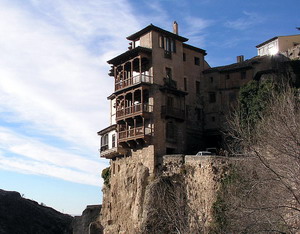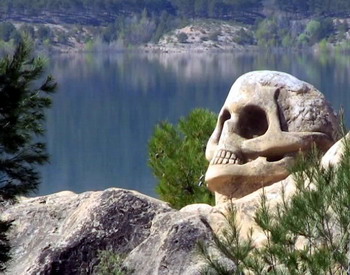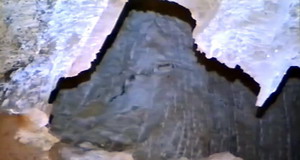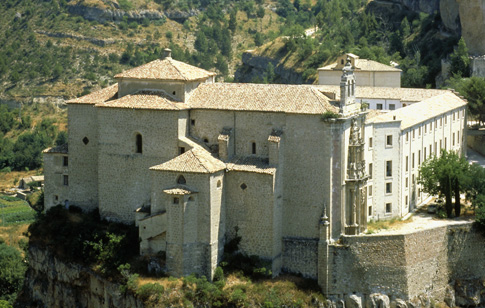|
Castilla-La Mancha is
an autonomous community in Spain, bordered by Castile and León,
Madrid, Aragon, Valencia, Murcia, Andalusia, and Extremadura. It is one
of the most sparsely populated of Spain's autonomous communities.
It is also has some of the most stunning and stark landscapes in the country.
Its capital city is Toledo,
and its most populated city is Albacete. |
 |
 Castile-La
Mancha or Castilla-La Mancha is where the fictional Don Quixote fought
imaginary windmills. Those windmills can still be seen today. The climate
of the region is desert-like, and the dialect of Spanish is very similar
to the Spanish spoken in Madrid. Castile-La
Mancha or Castilla-La Mancha is where the fictional Don Quixote fought
imaginary windmills. Those windmills can still be seen today. The climate
of the region is desert-like, and the dialect of Spanish is very similar
to the Spanish spoken in Madrid.
Although La Mancha is a windswept,
battered plateau, it remains a symbol of the Spanish culture with its sunflowers,
mushrooms, oliveyards, windmills, Manchego cheese, and, of course, Don
Quixote. Castilla–La Mancha has a continentalized Mediterranean climate.
This means that while the climate is similar to the typical Mediterranean
climate down on the coast, it is far more extreme, with very hot summers
and cold winters, with occasional snow.
The area boasts exceptional
hotels and rural accommodation,
including a selection of the iconic Paradores
of Spain, situated in restored castles and other enigmatic buildings.
Featured
province - Cuenca:
Of interest to note
is that tourists visiting the Cuenca area from 22 September 2014 will be
able to visit the natural park of La Serrania and most of the attractions
listed in the articles below using a new tour bus which has been launched
by the Cuenca Welcome Services company.
There will be a combination
of the three tour packages including visiting the Natural Park, the Enchanted
City, the Devil's window as well as options for sport fishing or adventure
sports (quad biking, canyoning or horseback ride). All packages include
tickets, bus transfers, guide, lunch offers and audio guide in four languages.
These tours will be available
during spring, summer and autumn and will leave from the railway station
at 10:20 hours and will collect tourists along the five remaining stops
in the capital (AC and NH Hotels, the bus station, Park of Los Moralejos
and UNED), and also a stop located in Villalba de la Sierra.
 The
city of Cuenca and the Hanging Houses - Spain The
city of Cuenca and the Hanging Houses - Spain
Located in the autonomous
community of Castilla-la Mancha in Central Spain, this historic city sprawls
across a steep spur, the slopes of which go down into the deep rocky gorges
of the Huécar and Júcar rivers. If you can even imagine
living in a house that quite literally hangs over the edge of a very steep
cliff, then you should visit Cuenca and its fascinating "Casas Colgadas"
or Hanging Houses... read more
 Unusual
destinations in Spain: The Route of the Faces Unusual
destinations in Spain: The Route of the Faces
Close to the dam at Buendía
in the Cuenca province of Castilla la Mancha lies a fascinating hiking
route, unlike any other in Spain. Sculpted into the natural façade
of the rocks and dotted among the beautiful landscape in the area are 18
carved faces and bas-reliefs. This is the Ruta de las Caras, or in English,
the Route of the Faces.... read
more
Visit
a Roman iron mine in Cueva del Hierro, Cuenca Province in Spain
Located in the upper Serranía
de Cuenca, approximately 80 kilometers from Cuenca in Castilla-la Mancha
can be found Cueva del Hierro, a small town with many antiquities from
the Celtiberian and Roman ages. The town is a quaint and friendly place
to visit, but its principal attraction is the Roman Mine, where small guided
groups can tour and learn much about the strip mining of iron back in those
days... read more
 Cueva
de la Mora Encantada – the Treasure of Hispania in a Roman mine in Torrejoncillo
del Rey, Cuenca Province in Spain Cueva
de la Mora Encantada – the Treasure of Hispania in a Roman mine in Torrejoncillo
del Rey, Cuenca Province in Spain
Cueva de la Mora EncantadaLapis
Specularis is a type of translucent gypsum, which was very much appreciated
as a mineral for the making of crystal windows and other decorative items
in ancient Rome....
read
more

Parador
de Cuenca
|





